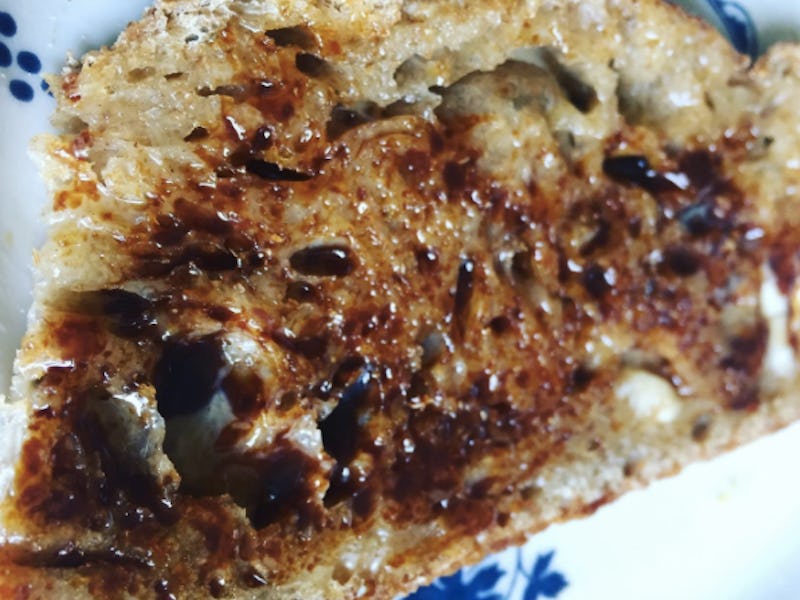
Every brunch-seeking tourist in Australia or the United Kingdom inevitably faces one difficult decision: Should I ingest the sharp-smelling, dark brown goop smeared on my toast? The yeast extract, marketed as Marmite in the UK or Vegemite down under, is an intensely salty, funky spread that’s as common as ketchup in these countries. Its ubiquity on breakfast tables has recently given scientists pause: In a new study, brain researchers uncovered evidence that suggests that yeast freaks should take caution.
The findings of the strange, small study from the University of York suggest that eating Marmite (they studied only one brand) is linked to brain function. In a paper published Wednesday in the Journal of Psychopharmacology, the researchers describe their study showing that the brains of people who ate a teaspoon of Marmite every day for a month had 30 percent less of a response to flickering visual stimuli compared to people who just ate peanut butter. The effect, which they measured using electroencephalograms of the brain, isn’t only transient.
“As the effects of Marmite consumption took around eight weeks to wear off after participants stopped the study, this suggests that dietary changes could potentially have long-term effects on brain function,” Anika Smith, a Ph.D. student in York’s Department of Psychology and first author of the study, said in a statement.
Understanding why Marmite has these seemingly strange effects on the brain requires asking one crucial question: What the hell is this stuff?
Marmite is made from yeast extract, which is what you get when you take living yeast cells and burst them in a super-salty solution, which causes the cells to release their contents. Out spills a cocktail of compounds, including, crucially, vitamin B12. This vitamin, which Marmite is additionally enriched with after it’s produced, is involved with the production of an important neurotransmitter called GABA, and the scientists noticed that people who ate a lot of Marmite tended to have increased GABA levels.
GABA’s job is to tell the neurons in the brain to chill out; without it, they’re like live wires, ready to respond and transmit messages at full strength. This sort of modulation is necessary to fine-tune its function. But when there’s more GABA than usual — say, because of excessive Marmite intake — the researchers hypothesize that the neurons will be excessively chill, and thus will respond to stimuli less than usual.
The study was small — they only looked at 14 Marmite eaters and their 14 peanut butter-eating counterparts — so the researchers make it clear that they’re not about to issue hungry Brits and Australians instructions to abstain from their favorite salty spread. “Although GABA is involved in various diseases we can make no therapeutic recommendations based on these results, and individuals with a medical condition should always seek treatment from their GP,” psychology professor Daniel Baker, the senior author of the paper, said in a statement.
It’s possible, too, that the effects were due to some other ingredient in the brown goo — perhaps one of the other B vitamins, or niacin, or folic acid — so follow-up studies will be necessary to figure out whether Marmite poses any particular health risks — or benefits. It’s possible, the researchers point out, that Marmite’s effects could inspire future treatments for GABA deficiencies caused by certain drugs.
In the meantime, there’s no official edict to avoid the stuff — but there’s also a pretty compelling reason to politely decline it, should you ever attend brunch hosted by someone who’s bought one of the 50 million jars of Marmite sold each year.